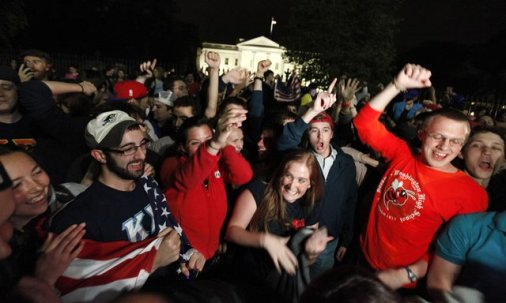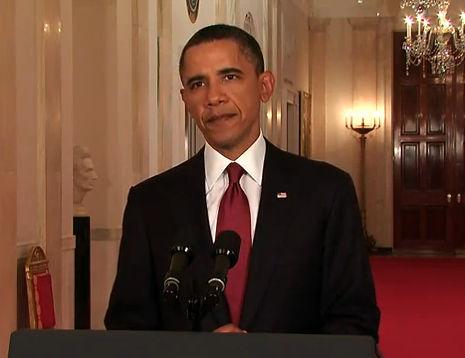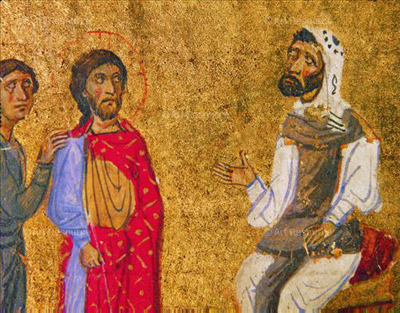Jesus loves Osama bin Laden
Posted by Ron George on May 3, 2011
It was the only story we heard early Monday morning. Osama bin Laden had been killed in a firefight by U.S. Navy Seals. President Obama had announced it about midnight, and before long a crowd had gathered at the White House to chant U-S-A and sing God Bless America. New York residents showed up at Ground Zero to celebrate – or keep vigil, according to one broadcaster. A clutch of Texans left balloons and flowers on the front lawn of former President George W. Bush’s residence in Dallas.
Let’s face it. We’re glad Osama is dead. Who on this side of the war on terrorism wouldn’t be? Somehow – and this was an almost universal sentiment among those who gathered in Washington and New York – this surgical strike put things right, evened the score. One young man said he believed a new era would dawn with Osama’s death. Things haven’t been so good in our country, he told NPR. He looked forward to a new beginning.
It reminded me of how some Palestinians danced in the street after the World Trade Center fell in 2001. It had put things right, somehow. An old score had been settled. Perhaps a new era would dawn. Things hadn’t been so good in Palestine all these years. Maybe this would be a new beginning.
Again and again we heard how Osama’s death would bring closure to the survivors of those who died on 9/11/2001, as well for thousands of Muslim victims of Al Qaeda’s terrorism. Underlying all of it was the sweetness of revenge.
Revenge does seem sweet, but it’s more like alcohol than honey. We’re likely to awaken with a hangover soon enough, because revenge isn’t sweet. Revenge is rooted in bitterness, impotence and rage. Revenge seems sweet because it releases pent-up anger that surges through our souls and can literally make us high. It feels damn good for a while, but then the bitterness and impotence return. We realize there is no bringing back the lives we’ve lost, not matter how much damage we inflict on the perps. If we don’t make peace with our grief, there is no healing of it – and revenge is no hope at all for that. Seeking revenge only delays healing. Healing begins with forgiveness, a powerful act of love. It’s pitiful that any survivor of a terrorism victim would hope in revenge as healing for grief. It simply doesn’t work that way.
When we take to the streets to gloat over the death of a man – even a bitter enemy – we demean ourselves and our just cause. In this case, we played the dead man’s game, because Osama bin Laden was about nothing if not revenge. It lay at the very heart of his 20-year campaign against western values and the despoiling of Arab lands by foreign armies and commercial interests. He was a deranged religious fanatic – and said to have been pious – who sought to get even with the West. He wanted to put things right, to settle old scores – the medieval Crusades for starters. He saw himself and his movement as the dawn of a new era, a new beginning for pure Islam unsullied by Western influence.
It is said Osama was jovial when the World Trade Center collapsed. They hadn’t expected that, he said. It was more than he’d hoped for. For a little while, revenge was sweet. Eventually, though, it left Osama with a bullet in his head and his body dumped into the sea. His followers are said to have had a “doomsday plan” ready in case their leader was killed. More revenge. More killing. More deaths of innocent men, women and children. Osama’s minions won’t be healed, either; but then, that’s not why they’re in this game. They’re playing to win at all costs, and revenge is just another violent tactic in their struggle against the West, an excuse for more killing.
President Obama set a proper tone. There wasn’t a whisper of revenge in his midnight announcement that Osama had been killed. He said it was just, and that’s true. Osama got what he deserved, surely. He had planned for his death, his martyrdom, according to news reports. He’d lived for five years in a million-dollar compound in Pakistan, but surely he knew that one day American special forces would come crashing through the gates. Doesn’t it feel great to know that he was blown away and that not one American was injured?
At some point in all this, though, Jesus people have to ask: What would the rabbi have said about it?
We wonder that a lot, don’t we? And most of the time we’re left wondering. Jesus never said a word about abortion or homosexuality. He didn’t speak about how to provide health care in a free society or the welfare system or political freedom. He never said a word about slavery or racism. He left no doubt, however, about loving our enemies. It wasn’t just a teaching, it was a command. It was how Jesus lived and, perhaps most important, it was how he died. If there is a lifestyle associated with the teaching of Jesus, it must be imbued with this unequivocal and utterly transformative ethic raised to a moral value. More than any other teaching in the Jesus tradition, this is what makes true discipleship hard. Damn hard, in fact, because it’s just not the way we are or want to be. It feels better to hate monsters like Osama bin Laden, but Rabbi Jesus says to love him. How? Aye, there’s the rub.
Jesus people have been pondering that for centuries and generally not measuring up very well. Jesus apparently wanted to defuse the revenge cycle so elegantly stated in the tradition he received as an eye for an eye. He demonstrated that love – understood as radical self-sacrifice – breaks the cycle of revenge and may transform enemies into friends. If Jesus was, indeed, God in the flesh, as Jesus people believe, then following Jesus must mean, as he said, taking up one’s cross – not one’s Bible, not one’s sacraments, not one’s sacred theology – and letting God’s love transform one’s ill-disposed self into someone capable of loving Osama bin Laden.
How? I wish I knew. I hated Osama bin Laden while he was alive, and I’m glad he’s dead. He got what was coming to him. The good guys won this round. As somewhat of a Jesus person, though, I’m brought up short by the rabbi’s teaching and example. The cycle of revenge has not been broken. There is more and more death and destruction to come. It will not end until we learn the hardest lesson of all from the ancient rabbi who never knew of airplanes used as terrorist weapons, who never knew of twin towers falling or the tens of thousands of Muslim men, women and children left dead or maimed in the wake of Osama’s terror campaign.
It will not end until we’re able to say with conviction – and without losing our lunch – that Jesus loves Osama bin Laden.



Fred Capps said
My biggest question remains, “Now what?”
We’ve brought the author of the 9/11 horror story to justice. But have we cut off the head of the snake? Or have we given the third world militants the martyr that will lead them to raise the bloody stakes?
Another question, perhaps even more important: Now that we have exacted justice by means of destroying two countries, what will we do to prove to the world that we are peaceful Americans, if not Christians? Will we rebuild those nations’ infrastructures? Provide aid? Build schools? Will we forge plowshares from our swords, now that they are no longer needed? I pray it to be so, but have little faith that we will see the “new Earth” in our lifetime.
LikeLike
Ralph Willis said
Ron your posting echoes my feelings exactly. I can only shake my head and wonder about the blood-lust that the demonstrators/celebrators have been displaying since the Presidents announcement. Of course, OBL had to go and it seems logical to me that we had to do it but do we have to be so jubilant about it. I remember sitting in a motel room in Little Rock the night dessert storm began and the sadness I felt watching the young fighter pilots returning to the Flight Deck with broad smiles and high-fives for everyone. I won’t judge either Bush’s decision to enter or the pilot’s courage and bravery for carrying out their duties. My problem then, as it is now, was to understand or accept the joy my fellow servicemen were displaying. My military career didn’t seem so glamorous that evening. Thanks for your posting my friend and keep it up. Ralph
LikeLike
Jan said
Yes. Here is something a friend forwarded to me right after you sent this link:
“Jesus said love your enemies. We acknowledge, that at times, this seems to be an impossible task. We have compassion for and pray for our leaders who have made difficult decisions, that would drive us to our knees. The hard work of building a more just, peaceful and equitable world continues. We pray,therefore, that “God’s holy and life giving Spirit may so move every human heart, that barriers which divide us may crumble, suspicions disappear, and barriers cease; that our divisions being healed, we may live in justice and peace; through Jesus Christ our Lord.”
“I have spent the day in deep prayer, discernment and conversation with my sisters and brothers at the Clergy Leadership Project. The death of Osama bin Laden and our Church’s appropriate response has consumed our attention. As sisters and brothers of Abraham and followers of Jesus, we are called to a path of love, justice and peace for the citizens of the globe. It is most appropriate that we spend our time in prayer, as guided by our Book of Common of Prayer and studying the teaching of Jesus in our Holy Scripture to determine how we should respond. Those teachings are clear, “we are to love our neighbors as ourselves – and we are to love our enemies.” These are the hard teachings of Jesus and our common prayers. Let us be willing to take the risk of building our souls by being true to who Christ has called us to become.”
—
The Rev. Dr. Gil Stafford
Vicar, St. Augustine’s Episcopal Parish staugustinestempe.blogspot.com
information at saintaugtempe@gmail.com
Chaplain, St. Brigid’s Community ecmasu.org
LikeLike